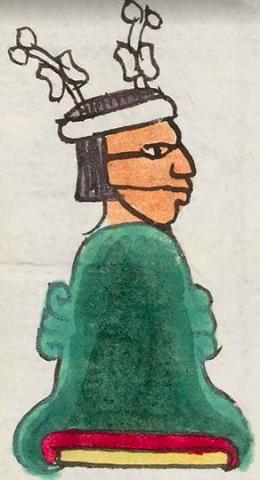Xocotitlan (Mdz35r)
This compound glyph for the place name Xocotitlan includes a human head (with face paint and an elaborate headdress) atop a hill or mountain (tepetl). The face/head consists of black line drawings. Only the face is colored, and it is a light terracotta. The face has two horizontal black lines that might represent face paint or tattooing. One is on the level of the eyes, and the other on the level of the mouth. The hair is short, to just above the shoulders. There appears to be a cap on top of the head. Coming out of the cap are what appear to be two flowers or butterflies. The head is shown in profile, with the person's face looking to the viewer's right. The hill is a standard, two-tone green bell shape, with rocky outcroppings on the slopes and horizontal stripes, one red and one yellow, near the base. The hill is a silent locative, apparently standing in for -titlan locative suffix.
Stephanie Wood
Presumably, the human head in some way represents the stem (Xoco-) in the place name. The analysis has yet to be completed. But we have a comparison in the other Xocotitlan glyph from the Codex Mendoza (see below, right).
Stephanie Wood
Stephanie Wood
c. 1541, or by 1553 at the latest
Stephanie Wood
faces, caras, mountains, hills, montañas, cerros, nombres de lugares

-tlan (locative suffix), place, https://nahuatl.wired-humanities.org/content/tlan
Codex Mendoza, folio 35 recto, https://digital.bodleian.ox.ac.uk/objects/2fea788e-2aa2-4f08-b6d9-648c00..., image 80 of 188.
The Bodleian Libraries, University of Oxford, hold the original manuscript, the MS. Arch. Selden. A. 1. This image is published here under the UK Creative Commons, “Attribution-NonCommercial-ShareAlike 3.0 License” (CC-BY-NC-SA 3.0).


